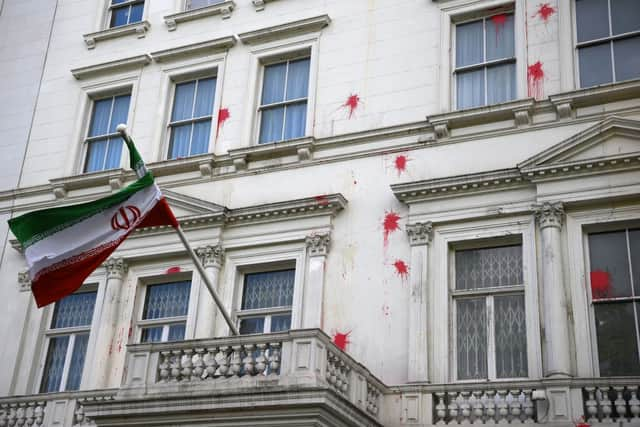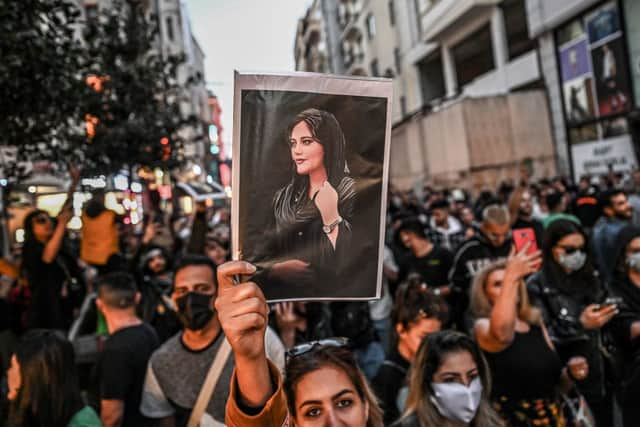Iran protests: activist urges UK government to close Iranian Embassy as it is a ‘threat to national security’
and live on Freeview channel 276
An Iranian woman and activist has urged the government to close the Iranian Embassy in London, warning that it is a “threat” to the UK’s “democracy, way of life, and national security”.
Anti-regime protests broke out in Iran in September, when 22-year-old Mahsa Amini died in police custody after being arrested for allegedly wearing her hijab too loosely. Since then, hundreds of citizens, including children, have been killed as officials crack down on protesters - with thousands others arrested.
Advertisement
Hide AdAdvertisement
Hide AdAzadeh Zabeti, Co-President of the Committee of Anglo-Iranian Lawyers, told the UK government to take “robust and firm measures against the tyrants and oppressors of Iran” - instead of just “wagging its finger” at the regime. She said that while she welcomes the verbal condemnation of the events in Iran, the international community needs to speak in the “language that all bullies understand.”
Addressing a conference held by The British Committee for Iran Freedom at the UK Parliament on Wednesday (14 December), Ms Zabeti said: “I speak in a personal capacity as an Iranian woman and an Iranian exile, and as someone who has had family members tortured, imprisoned and executed by this regime.
“If the international community had acted prior to now and taken stronger, more robust measures, perhaps we wouldn’t see this number of people who have been unlawfully killed by this regime. The Iranian people have done their part and continue to do their part. But it is now not only incumbent on the international community, but it is their duty and their responsibility to act.”


She went on to outline the key actions which the UK government should take. Included in her list was closing the Iranian Embassy in London, which she described as a “building that houses terrorists, murderers and spies”, and expelling Iran from its seat at the United Nations.
Advertisement
Hide AdAdvertisement
Hide Ad”A seat at the UN should be a privilege of nations, and definitely not one that Iran deserves,” she explained. “The fact that Iran was ever on the committee, particularly the Women’s Commission, is an insult to the Iranian people and a stain on the reputation of the UN.” A couple hours after the conference concluded, Iran was kicked off the UN Commission on the Status of Women.
Ms Zabeti also asked for Iran’s diplomats to be removed from the UK, and for the Islamic Revolutionary Guard Corps and Iran’s Ministry of Intelligence and Security to be added to the “proscribed list of terrorist organisations.”
Her comments came as part of a British Committee for Iran Freedom conference held by a group of cross party MPs and Peers, who were announcing their recommendations to the UK government on how best to support the protesters in Iran. Amongst those present were Tory MPs Matthew Offord, David Jones and Bob Blackman, and Labour MP Steve McCabe, all of whom have recently been sanctioned by the Iranian Government.
Mr Offord told the conference that Iran would have to “send an army” to stop him speaking out, while Mr Jones said he was “uplifted” by his recent sanctioning as it meant he “must be doing something right.” Mr Blackman added that although “it places our personal security at risk, we will not be cowed.”
Advertisement
Hide AdAdvertisement
Hide AdThe MPs also commended Foreign Secretary James Cleverly’s response to the situation in Iran, giving as examples his decision to summon Iran’s most senior diplomat in Britain and sanction Iranian court judges and prison officials. But they argued more must be done.


Protests in Iran first broke out in September, when Ms Amini died in police custody after being arrested for allegedly wearing her hijab too loosely. Iranian authorities said she died of a sudden heart attack, but Ms Amini’s family suggested she was killed - and Ms Zebati told today’s (14 December) conference that the young woman had been “savagely beaten to death”.
Since then, hundreds of citizens, including children, have been killed as officials crack down on protesters - with thousands others arrested. The most recent developments include the brutal executions of Mohsen Shekari, 23, and Majidreza Rahnavard, also 23, who was publicly hanged from a crane for crimes he allegedly committed during the anti-government protests.
Commenting on the death sentences, Mz Zebati said it was an “attempt from the Iranian regime to silence the dissent of the Iranian people, and instill fear in the families of the victims, the community, and society as a whole.” She also condemned the “sham courts” that are sentencing protesters, arguing there was “absolutely no justice.”
Advertisement
Hide AdAdvertisement
Hide AdAlso present at the conference was 19-year-old Nikka Sharifi, who described how she escaped Iran with her family three years ago. She emotionally spoke of how while she was able to “pursue her dreams like a normal teenager,” her peers in Iran “are worried about their lives and freedom [and] don’t have the option to think about their future.”
She used her speech to draw attention to some of the teenagers who had lost their lives in the protests. Just some of those Ms Sharifi mentioned included 16-year-old Nika Shakarami, who was found dead in a courtyard after burning her headscarf in an anti-government demonstration, and Asra Panahi, who she said “died at the age of 15 after getting beaten for refusing to join pro-regime rallies”.
Comment Guidelines
National World encourages reader discussion on our stories. User feedback, insights and back-and-forth exchanges add a rich layer of context to reporting. Please review our Community Guidelines before commenting.
